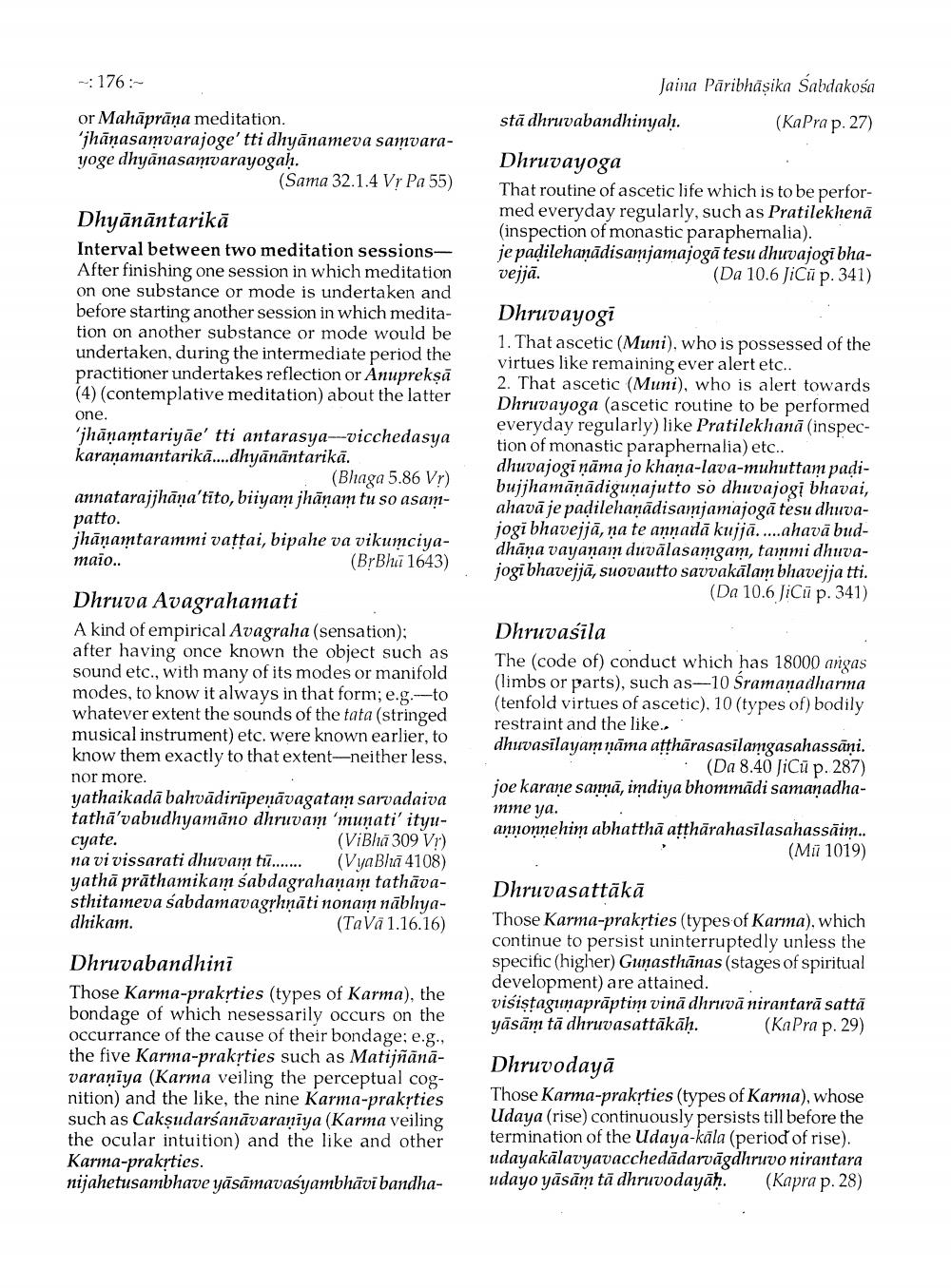________________
~:176~
or Mahaprana meditation. jhanasamvarajoge' tti dhyanameva samvarayoge dhyanasamvarayogah.
(Sama 32.1.4 Vr Pa 55)
Dhyanantarikā
Interval between two meditation sessionsAfter finishing one session in which meditation on one substance or mode is undertaken and before starting another session in which meditation on another substance or mode would be undertaken, during the intermediate period the practitioner undertakes reflection or Anuprekṣa (4) (contemplative meditation) about the latter
one.
'jhanamtariyae' tti antarasya-vicchedasya karanamantarika....dhyänäntärikā.
(Bhaga 5.86 Vr) annatarajjhana'tito, biiyam jhanam tu so asam
patto. jhanamtarammi vaṭṭai, bipahe va vikumciya(BrBhi 1643)
maio..
Dhruva Avagrahamati
A kind of empirical Avagraha (sensation); after having once known the object such as sound etc., with many of its modes or manifold modes, to know it always in that form; e.g-to whatever extent the sounds of the tata (stringed musical instrument) etc. were known earlier, to know them exactly to that extent-neither less,
nor more.
cyate.
yathaikada bahvādirūpeṇāvagatam sarvadaiva tatha'vabudhyamano dhruvam 'munati' ity(ViBl 309 Vr) na vi vissarati dhuvam tu........ (VyaBhā 4108) yatha prathamikam sabdagrahanam tathavasthitameva sabdamavagṛhṇāti nonam nabhyadhikam. (TaVa 1.16.16)
Dhruvabandhini
Those Karma-prakrties (types of Karma), the bondage of which nesessarily occurs on the occurrance of the cause of their bondage; e.g., the five Karma-prakyties such as Matijñānāvaraniya (Karma veiling the perceptual cognition) and the like, the nine Karma-prakṛties such as Caksudarsandvaraṇiya (Karma veiling the ocular intuition) and the like and other Karma-prakrties. nijahetusambhave yāsāmavasyambhāvi bandha
Jaina Paribhāṣika Sabdakośa
(KaPra p. 27)
sta dhruvabandhinyaḥ.
Dhruvayoga
That routine of ascetic life which is to be performed everyday regularly, such as Pratilekhena (inspection of monastic paraphemalia). je padilehanadisamjamajoga tesu dhuvajogi bhavejja. (Da 10.6 JiCü p. 341)
Dhruvayogi
1. That ascetic (Muni), who is possessed of the virtues like remaining ever alert etc..
2. That ascetic (Muni), who is alert towards Dhruvayoga (ascetic routine to be performed everyday regularly) like Pratilekhana (inspec tion of monastic paraphernalia) etc... dhuvajogi nama jo khana-lava-muhuttam padibujjhamāṇādiguṇajutto so dhuvajogi bhavai, ahava je padilehaṇādisamjamajoga tesu dhuvajogi bhavejjā, ņa te anṇadā kujjā.....ahava buddhana vayanam duvālasamgam, tammi dhuvajogi bhavejja, suovautto savvakalam bhavejja tti. (Da 10.6 JiCu p. 341)
Dhruvasila
The (code of) conduct which has 18000 aigas (limbs or parts), such as-10 Śramaṇadharma (tenfold virtues of ascetic). 10 (types of) bodily restraint and the like.. dhuvasilayan nama aṭṭhārasasilangasahassani. (Da 8.40 JiCap. 287) joe karane samma, imdiya bhommadi samanadhamme ya. anonmehim abhattha atthärahasilasahassaim.. (Mi 1019)
Dhruvasattäkä
Those Karma-prakṛties (types of Karma), which continue to persist uninterruptedly unless the specific (higher) Gunasthanas (stages of spiritual development) are attained.
visistaguṇapraptim vinä dhruva nirantară sattā yāsām tā dhruvasattäkäh. (KaPra p. 29)
Dhruvodaya
Those Karma-prakṛties (types of Karma), whose Udaya (rise) continuously persists till before the termination of the Udaya-kala (period of rise). udayakalavyavacchedädarvägdhruvo nirantara udayo yāsām tā dhruvodayaḥ. (Kapra p. 28)




